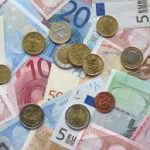 Donald Trump says the euro is undervalued, particularly pre-Article 50 when it was trading at near parity with the dollar. In an op-ed published recently by German economist Hans Werner Sinn, Trump’s euro call is proven to be not far off –base.
Donald Trump says the euro is undervalued, particularly pre-Article 50 when it was trading at near parity with the dollar. In an op-ed published recently by German economist Hans Werner Sinn, Trump’s euro call is proven to be not far off –base.
He says the Trump administration is ‘basically right’ that the euro is undervalued.
“Germany’s trade surplus is rooted in the fact that Germany sells its goods too cheaply. Here, the Trump administration is basically right,” he says. “The euro is too cheap relative to the U.S. dollar, and Germany is selling too cheaply to its trading partners within the euro zone. This undervaluation boosts demand for German goods in other countries, while making Germany reluctant to import as much as it exports.”
Worth noting for those regime changer investors out there that like to buy into big political shifts: one of the biggest bones of contention France has with the European Union leadership is the fact that it deems Germany as benefiting most by moving its factories to new and cheaper labor in the euro zone. Germany’s unemployment is around 4%. France is more than double that. If the French see things the way Marine Le Pen does, then she will win in May, as Goldman Sachs continues to warn investors.
The euro is currently trading at $1.07. It was $1.01 prior to Article 50 which began the U.K.’s divorce from the E.U. The purchasing power parity for the OECD nations stands at $1.29. This implies a 17% undervaluation of the euro, according to Sinn.
Europe is now the place to watch for big shifts in sentiment, and the potential for new financial crises.
This month the European Central Bank begins to cut back on its bond purchases to 60 billion euros from 80 billion euros. The ECB acknowledges that deflationary risks have disappeared but it does not seem ready to exit its current monetary policy program of negative interest rates. The bank is basically buying toxic debt no one wants to hold as interest rates rise. Who wants a -0.05% bond, when you can hold a 0.00% one!?
Loan growth in the Eurozone is subdued and the banking system is still fragile. Bank deposits are dwindling as institutional depositors take their money out of the system and buy foreign real estate or put it into private equity and other securities. Fixed income there is junk.
The potential for crisis not only sits with Le Pen dumping the euro if she wins, but is even bigger if one considers that Europe’s banking system is the biggest in the world. And QE and negative interest rates have only stabilized a terrible situation. Unemployment is still double digits in Portugal, Italy and France. Greece remains a basket case. Poland, which once wanted to be a euro member, is sticking with the zloty.
For global fixed income investors, Italian and French yield spreads are widening against the 10-year bund yield. The ECB’s ‘taper’ is estimated to result in around 160 million euros being pulled from the Italian bond market, meaning private investors will have to pick up the slack as Mario Draghi of the ECB stands down. If they don’t, those yields will rise further, and current bond values will be decimated. The ECB basically financed Italy’s entire budget deficit last year, yet Italy’s debt-to-GDP ratio is now higher than it was in 2012 and the European Commission, in its latest economic forecasts, says that the Italian government debt-to-GDP ratio will topple 133% this year, thanks to an infamously bloated public pension system that no one has the political appetite to fix.
Back to Hans Werner Sinn, the economist argues that the ‘real culprits’ are an inflationary credit bubble in southern Europe caused by the expansionary policies of the ECB and the remnants of the mortgage backed derivative bubble in 2008.

